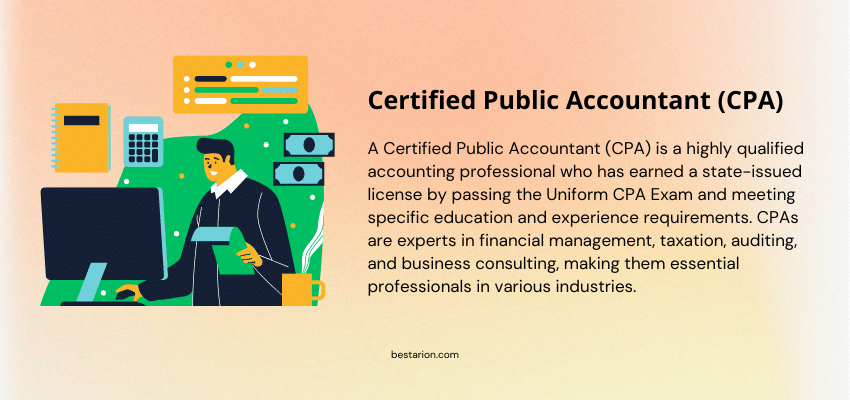Certified Public Accountant (CPA): Roles, Responsibilities, and Career Paths

What is a Certified Public Accountant (CPA)?
A Certified Public Accountant (CPA) is a licensed accounting professional who has passed the Uniform CPA Exam, administered by a state’s Board of Accountancy. This designation signifies expertise in accounting, auditing, taxation, and financial management.
The CPA exam is developed under the guidelines of The American Institute of Certified Public Accountants (AICPA). To be eligible to take the exam, candidates must typically hold a bachelor’s degree and have relevant professional experience in accounting.
Many other countries have equivalent certifications. For example, the Chartered Accountant (CA) designation, originally established in Scotland, is widely recognized in several nations as an alternative to the CPA credential.

History of the CPA Designation
The Certified Public Accountant (CPA) designation has a long history dating back to 1887, when a group of accountants formed the American Association of Public Accountants (AAPA). Their goal was to establish ethical standards and create auditing guidelines for government agencies, private companies, and nonprofit organizations.
Over time, the organization underwent several name changes before becoming the American Institute of Certified Public Accountants (AICPA) in 1957. The first CPA licenses were issued in 1896.
In 1934, the Securities and Exchange Commission (SEC) mandated that all publicly traded companies submit financial reports verified by certified accountants. Initially, the AICPA was responsible for setting accounting standards, but in 1973, the Financial Accounting Standards Board (FASB) was established to oversee private sector accounting rules.
During the late 1990s, large accounting firms expanded into consulting services, fueling industry growth. However, the 2001 Enron scandal led to a major shake-up in the profession, including the collapse of Arthur Andersen, one of the country’s top accounting firms.
To restore trust in financial reporting, the Sarbanes-Oxley Act of 2002 introduced stricter regulations, imposing tougher restrictions on accountants’ consulting activities.
Role and Responsibilities of a CPA
A Certified Public Accountant (CPA) is a licensed professional responsible for maintaining financial integrity, ensuring compliance with regulations, and providing strategic financial guidance to businesses and individuals. Their key roles and responsibilities include:
1. Financial Reporting and Compliance
- Prepare and review financial statements to ensure accuracy and compliance with accounting standards.
- Ensure businesses adhere to federal, state, and local financial regulations.
- Conduct audits to verify financial data and detect discrepancies or fraud.
2. Tax Preparation and Advisory
- Prepare tax returns for individuals, businesses, and organizations.
- Develop strategies to minimize tax liabilities while ensuring legal compliance.
- Advise clients on tax planning, deductions, and credits to optimize financial outcomes.
3. Auditing and Assurance Services
- Conduct external and internal audits to assess financial health and operational efficiency.
- Provide assurance on financial statements for stakeholders, investors, and regulatory bodies.
- Identify risks and recommend internal controls to mitigate financial discrepancies.
4. Business and Financial Consulting
- Offer strategic financial planning and budgeting assistance to businesses.
- Provide insights on investments, cost management, and profit maximization.
- Assist with business valuations, mergers, acquisitions, and financial forecasting.
5. Regulatory and Ethical Compliance
- Stay updated with changes in accounting laws and tax regulations.
- Ensure businesses adhere to ethical financial practices and professional standards.
- Help organizations implement internal controls to prevent financial mismanagement.
6. Career and Professional Development
- Maintain CPA licensure through ongoing continuing education.
- Keep up with industry trends, technological advancements, and accounting best practices.
CPAs play a vital role in financial decision-making and regulatory compliance, making them indispensable to businesses, individuals, and government entities alike.
How to Become a CPA
Becoming a CPA requires a combination of education, experience, and examination. Here are the key steps:
1. Education Requirements
Most states require CPA candidates to complete 150 credit hours of education, which typically includes earning a bachelor’s degree in accounting, finance, or business administration. Some states may also require additional coursework in ethics and business law.
2. Gaining Professional Experience
Most states require candidates to have 1-2 years of work experience under a licensed CPA. This experience can be gained through public accounting firms, corporate finance departments, or government agencies.
3. Passing the Uniform CPA Exam
The Certified Public Accountant (CPA) Exam is a 16-hour assessment divided into four sections, each requiring four hours to complete. The exam consists of three core sections that all candidates must complete, along with one discipline section of their choice from three available options.
Core Sections:
- Financial Accounting and Reporting (FAR)
- Auditing and Attestation (AUD)
- Taxation and Regulation (REG)
Discipline Sections (Candidates Choose One):
- Business Analysis and Reporting (BAR)
- Information Systems and Controls (ISC)
- Tax Compliance and Planning (TCP)
Each section comprises a mix of multiple-choice questions (MCQs) and task-based simulations (TBSs). For instance, the AUD section includes 78 MCQs and seven TBSs.
To pass the CPA exam, candidates must achieve a minimum score of 75% on each section. The exam is known for its difficulty, with some sections having pass rates below 50%. The most challenging section is BAR, with a 41.04% pass rate, while the easiest is TCP, with a 78.16% pass rate.
Candidates take each section separately and have the flexibility to choose the order in which they complete them. However, all four sections must be passed within an 18-month period to earn the CPA designation.
4. Obtaining a CPA License
After passing the exam, candidates must apply for a CPA license through their state’s Board of Accountancy. Requirements vary by state but often include ethics exams and ongoing education commitments.
CPA Career Paths
CPAs have diverse career opportunities in various industries. Common career paths include:
1. Public Accounting
- Working for firms like Deloitte, PwC, KPMG, or Ernst & Young (Big Four Accounting Firms)
- Conducting audits, tax preparation, and advisory services for businesses and individuals
2. Corporate Accounting
- Serving as an accountant, controller, or Chief Financial Officer (CFO) within a company
- Managing financial statements, budgeting, and compliance
3. Government and Nonprofit Accounting
- Working for federal agencies (e.g., IRS, SEC, FBI) or state/local governments
- Ensuring financial transparency and regulatory compliance
4. Forensic Accounting
- Investigating fraud, embezzlement, and financial crimes
- Assisting in legal cases involving financial disputes
5. Consulting and Advisory
- Providing business strategy, investment guidance, and risk management services
- Working as an independent consultant or within large firms
Many CPAs advance to executive roles such as controller or chief financial officer (CFO).
Regardless of where they work, CPAs are responsible for preparing, maintaining, and reviewing financial statements. They often handle tax filings for both individuals and businesses and are authorized to conduct and certify audits.
While CPAs are well known for income tax preparation, they can also specialize in:
- Auditing – Ensuring financial records are accurate and compliant.
- Bookkeeping – Managing day-to-day financial transactions.
- Forensic Accounting – Investigating fraud and financial misconduct.
- Managerial Accounting – Assisting with budgeting and financial planning.
- Information Technology (IT) Accounting – Overseeing financial systems and controls.
A CPA license is not required for corporate or private accounting jobs. However, public accountants—those working at firms like Deloitte or Ernst & Young, which offer accounting and tax services to businesses—must hold a CPA designation.


